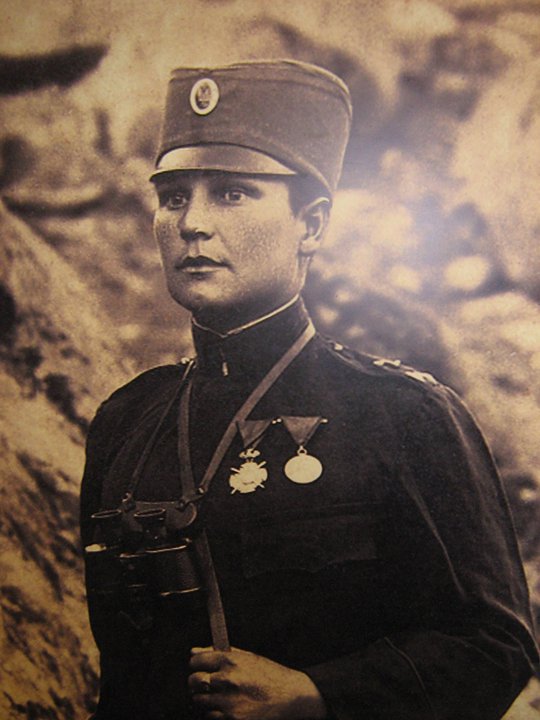British-Serbian relations celebrated in heroic tale of women at war
 The heroism of two women who met on the battlefields of Serbia will be recalled in a play to debut in London, this month, before a proposed tour of Britain and Serbia.
The heroism of two women who met on the battlefields of Serbia will be recalled in a play to debut in London, this month, before a proposed tour of Britain and Serbia.
(un)decorated will portray the forgotten story of Yorkshire-born adventurer Flora Sandes (pictured right) and the most decorated female soldier in the history of war, Serbian shepherdess Milunka Savić (pictured below).
The Serbian City Club production at London’s Royal Central School of Speech and Drama commemorates the centenary of the Great War and is supported by the British Embassy in Belgrade and the Serbian Embassy in London.
This relationship is at the heart of the story, which emphasises the strength of diplomatic relations between the two countries for 177 years – one of the longest in British political history.
(un)decorated stage play tells the courage of woman at war
This multimedia piece from playwright Duška Radosavljević is being brought to the stage by director Maja Milatović-Ovadia and London-based actors Laura Harling, Peter Randall, Cristina Catalina, Vesna Vujat and Darko Barić, as part of the UK’s annual Serbian Month.
“Finding out about the British-Serbian relations has been insightful,’ said actress Vesna Vujat. “With so many WWI commemorations it is surprising that the astounding work of so many women has gone unnoticed.
“Remembrance seems focused on male heroism and, in many ways, marginalising civilians. I was glad to learn more about less mentioned points of view.”
Using personal memoirs, interviews and biographies of two of the most decorated women who fought in the Great War, the piece seeks to shine the light on the unsung heroines.
Additional materials used in the development of this multimedia work will include ‘Nineteen Fifteen‘ by the Serbian author Branislav Nušić, as well as, original video and sound footage.
“To start with, Duška put together a really rich text for us to work with,’ said actress Vesna Vujat. “She and Maja gave us actors the opportunity to shape the text and our characters. It has been a truly riveting and collaborative process.
Serbia suffered great losses in First World War
By some estimates Serbia lost 25% of its mobilised people during the four years of the First World War – the highest number of casualties among the Allies.
Flora Sandes volunteered within a week of the outbreak of war in 1914. When that offer was declined, she joined a small group of nurses and volunteers heading to serve at the hospital in Kragujevac, Serbia, where women in service were more commonplace.
For her military service in Serbia – including a serious shrapnel injury – and her efforts to raise war relief from Britain, Flora was awarded the King George Star, Serbia’s highest military honour.
Flora had served a year as a nurse in Serbian hospitals before she and Milunka Savić fought for the Iron Regiment, named for its apparent invincibility. Flora’s memoir recounts their meeting in a hospital in Bizerta, where they both lay recovering from battle wounds.
Memoirs of heroism form Serbian City Club story
The piece will use this encounter to emphasise the Serbian experience of the First World War and the way in which personal and national motives become intertwined in a quest for freedom. Given the main characters, it is inevitable that a further theme is how female pragmatism can counter patriotic idealism.
The production will premiere on 13th January at 19:30, at the Royal Central School of Speech and Drama, Embassy Theatre, 62-64 Eton Avenue, London NW3 3HY.
Tickets: £10 in advance or available on the door.
For further information see Serbian City Club or contact natasha.kocsis@serbiancityclub.org.



4 / 6 / 2015 10:15 am
I mi srbi volimo engleze i francuze nase saveznike onoliko koliko oni to vole nas, ali imamo jednu veliku razliki mi Srbi nikada encemo da im otimamamo onako kao sto to oni cinise nama i me se niakda en hlavlimo otetim kao franacuzi stubom iz egipta jer mi imamo i previse dao nam Bog da imamo te nehajemo za njih koji stalno otimaju kradu ubijaju pljacakaju jer mi Srbi znamo kosmo i sta smo jedino bi ostali trebali da priznaju naucne rezultate kojeje nauka njihova nedavno objavila ne nama Srbima vec njima samima